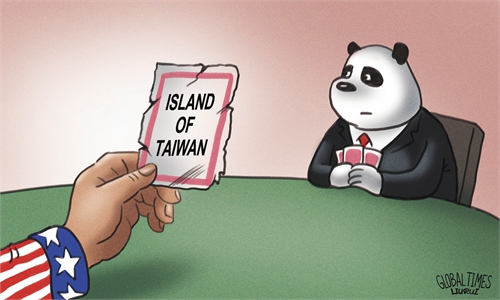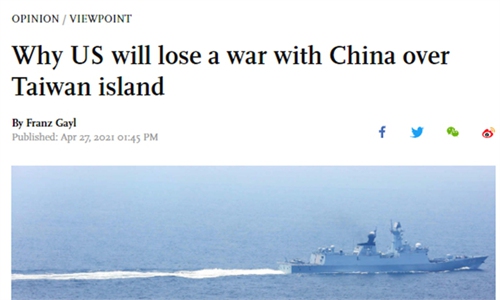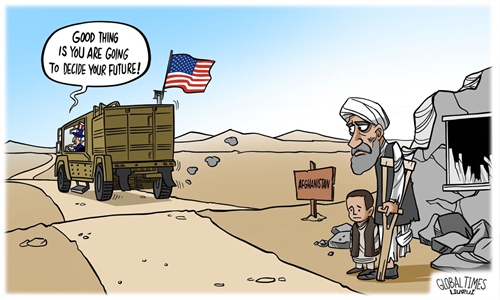US' Taiwan defeat preordained by fighting for weaker cause: Pentagon whistle-blower
He is called a "Beijing mouthpiece," a "Communist" and a "traitor," and he was investigated by the US government for writing for the Global Times and warning about risks of war with China over the Taiwan question. His name is Franz Gayl (Gayl), a retired US Marine Corps infantry officer and a civil servant in the Pentagon. Why did he choose to warn about a possible war in a Chinese media outlet? How is the US' Taiwan policy hijacked by the military-industrial complex? Global Times (GT) reporter Wang Wenwen talked to Gayl about these matters.
About whistle-blowing
GT: Years ago, due to your whistle-blowing, US Marine Corps officers initiated a counterintelligence investigation and removed your access to classified information in reprisal for making protected disclosures. Why did you choose to retire this time?
Gayl: First of all, concerns that I had in the past were much different than those relating to the Taiwan island. Now, they have one common motivation. And that starts with me being a marine. We should not sacrifice the lives of American patriots, whether marines, soldiers, sailors, or airmen for laws, policies, and special interests that are counter to our national security interests. We've seen this pattern in the past. We should learn from history and not repeat it. As for your question regarding (my) retirement, I want to leave while I still have an opportunity to start something new.
GT: You thought that the restrictions placed on you this time were revenge and you had made a repeal. But the results by the US Marine Corps say that without the approval of, or notification to, HQMC officials, you posted multiple articles in the Global Times, which the US State Department designated as a "foreign mission." Therefore, it initiated a counterintelligence investigation and removed your access to classified information. What's your opinion of this result?
Gayl: Going back, I have felt compelled to disclose the dangerous Taiwan island issue, since I first researched and wrote on it in 2005, so this is nothing new. Those disclosures accurately predicted what is unfolding today. Over the years, I have written to presidents Bush, Trump, Biden, and recently the administration's national security team. I was fortunate to have one of my articles published in our Marine Corps Gazette, but my subsequent op-eds to US papers were all rejected. And it was really the public that needs to hear these points.
So my perspective has been ignored for many reasons, probably because I am a low-level Pentagon bureaucrat. But the issue is urgent. When I reached out to the Global Times, it caused my Pentagon removal and the initiation of investigation. I saw no other avenue to raise the issues. My retirement is scheduled for March 2022.
GT: In 2007, you revealed that the US Marine Corps' "gross mismanagement" led to the casualties of hundreds of marines in Iraq. The revelation triggered attention from then senator Biden who praised you as a hero. After you published a series of articles in the Global Times, have any US officials or lawmakers got in touch with you?
Gayl: In brief, no. Back in 2007, Senator Joseph Biden wanted to champion better armor vehicles for war fighters engaged in combat in Iraq and Afghanistan. Reports said that bureaucratic obstruction delayed their fielding, causing the unnecessary deaths of hundreds of Americans. The reports energized his efforts.
The senator's fight for increased Congressional funding accelerated the deliveries, and it ended up saving many lives. He should definitely be commended for that. His support of me was also much appreciated at the time, but that is unlikely to happen this time.
GT: Only when US media got to know you were investigated by the DoD did they publish articles about you and your viewpoints. Was the media attention within your expectation? Why have US media outlets shown little interest in the topic of "The US will lose war with China over Taiwan"?
Gayl: The early media treatment was predictable and it did little to highlight the danger of war. Readers, as is often the case, were more interested in this sort of circumstance - the mind of a civil servant, my loyalty, motives, why would I be doing this, am I just looking for 30 seconds of fame? Am I insane? Those are human interest topics. It's sort of a morbid curiosity in a suspicious messenger, not in the Taiwan island issue. To be taken seriously requires China credentials and name recognition. And I certainly don't have that. Also the idea that the US would lose a war with China or anyone else is for many Americans still inconceivable.
However, the number of US voices against war over Taiwan island is just growing. In a Russia Today op-ed, US marine Scott Ritter warned that the US cannot defend Taiwan and China knows it. And he later restated this view in a very important Global Times interview. Lieutenant Colonel Daniel Davis, USA (retired) echoed many of those concerns in a recent Guardian article. Lieutenant Colonel Davis several years ago predicted our defeat in Afghanistan. He was certainly an expert who would know at a time US leaders falsely reported progress and sought Davis' silence. And here we are today, precisely what he predicted happened. So he's a very authoritative voice.
Also in a Washington Post op-ed, Michael Sciulla, who I am not familiar with but is well known in the Washington DC area, exposed the insanity of fighting China over the Taiwan island. Also, over the past couple of years, Dr Henry Kissinger and very recently, the vice chairman of the joint chiefs of staff, cautioned that a war with China will be a catastrophe for everybody's concern.
And then there's a recent individual who was published on the Global Times, the very distinguished Graham Allison. He made us aware of the Thucydides Trap which he wrote a book on. In brief, he showed that when rising powers throughout history like China today rival ruling powers like the US today, how this normally leads to the war. Or at least that's the pattern. It is not that it absolutely needs to happen. If we're thoughtful about it, it doesn't happen. But that's the pattern.
If no one is going to pay attention to my op-eds, that's fine. But credible assessments from such distinguished people should be read by our president before it's too late.
GT: After retirement, will you continue to pay attention to Taiwan-related topics?
Gayl: The Taiwan island will remain an explosive flashpoint. And visibility of the danger could lead to policy debate that might help avoid war. Certainly those sharing these concerns could include me and could continue to write and speak on the topic.

Franz Gayl
About TaiwanGT: Between 1 and 10, how likely do you think a war would occur between China and the US over Taiwan, and when could it be? Why does the current state of affairs inevitably lead to war?
Gayl: First of all, I'm unqualified to speculate about the likelihood or timing of war. However, in predicting military outcomes, it is normal for analysts to compare the physical capacities of adversaries to fight. That too is beyond my expertise.
However, one thing I can say from research and writing is when it comes to Taiwan island, it is the will to victory that is the most important measure, not necessarily physical capacities. China's historically demonstrated tenacity and endurance on national security priorities are well known to the US given our country's defeat by Chinese forces in Korea and the current stalemate, for example. Since Taiwan island will always mean measurably more to China than to the US, the outcome of war can be confidently predicted.
The three joint communiqués laid out a path to peaceful reunification of One China, which both nations, the US and China, sincerely believe, would have avoided the current tension. But the US undermined that path, first by passing the Taiwan Relations Act in 1979 and second, by embracing secessionist ambitions of the Democratic Progressive Party, effectively abandoning the spirit of the three communiqué. China may find it necessary to reunify by force. It's possible. If the US militarily intervenes, I think it's pretty safe to say that a total unrestricted war is certain. Also, the likelihood that wars prematurely triggered by mistakes and miscalculations in the air and sea and undersea surrounding the island is increasing. History has many examples where unplanned incidents and accidents cascaded in major wars. A Serbian assassin triggered European treaty obligations that unfolded into World War I. An alleged incident in the Gulf of Tonkin led to America's entry into Vietnam, or was used as an excuse to do that.
And more recently, we had over Hainan island around the turn of the century an unintended collision between military aircraft. Any one of those minor incidents could have caused calamity that neither one of our countries intended in the first place.
Regionally, the treaty of entanglements and the region of the world are also similar to the pre-WWI. US treaties with Japan, Australia, the Philippines, and South Korea are interrelated when conflict breaks out. And China's treaties with North Korea and Russia are similarly interrelated. You can't get around the connectivity between these arrangements.
Some in the US that I've spoken with downplay Russia's interest in the Taiwan island conundrum. But the 2001 China-Russian treaty constitutes an implicit defense pact. In it, Russian states specifically that Taiwan is an inalienable part of China.
GT: You once said the US may go to a conflict with China over Taiwan when daydreaming if it doesn't do anything. What specifically prompted you to make the "daydreaming" comment?
Gayl: We have to focus on China's self-narrative regarding the non-negotiable Taiwan Province, not our own ideas of how we think the world should be.
There are many sincere idealists who without knowing the details of the history would say they feel very good on the position of believing in the American narrative on Taiwan. But in fact, we have to soberly accept the fact that China's most explosive red lines pertain to any threats to the integrity of one sovereign China, one that is unchanged over centuries, even thousands of years. This unyielding determination is characteristically Chinese and we need to acknowledge these facts. The US military studies the great strategists in history, including Carl von Clausewitz of Germany and Chinese strategist Sun Tzu. Looking at what one of these great minds would say about this. Clausewitz might say that China has the advantage of interior lines in a war with the US and that advantage is magnified by the island's proximity to the mainland and distance from the US. Much more important than geography is China's psychological advantage.
Sun Tzu stated, when you surround an army, leave an outlet free. And that will perhaps reduce the intensity or the inevitability of war. And it's a natural psychological reaction. China perceives encirclement by powers, wishing to contain and divide it, with no outlet. China will therefore fight a total unrestricted war to preserve its integrity and civilization just as we would.
Sun Tzu also stated, if they will face death, there is nothing they will not achieve. And this has to do with tenacity and endurance at the minimum. China would fight out of survival necessity while the US would choose to fight as an option. The reason our defeat is preordained in this situation is because we would be fighting for the weaker cause, which is often the case in what we call expeditionary operations. But China hawks in the US suggest that our strategic arsenal remain a decisive advantage over China. But when you look at it in full context, China, Russia and other countries collectively have a vast arsenal of similar weapons. And that negates any perceived advantage. It's very unfortunate when we have to talk about such apocalyptic outcomes as options. It's just terrible.
In the end, we are much better off not fighting, preserving our formidable military, which we are rightfully very proud of, for the defense of our own core national security priorities, namely America's own sovereign civilization.
GT: You suggested that Washington acknowledge China's sovereignty over Taiwan. Why did you make such a statement?
Gayl: Civilizations, from my perspective, can be viewed as physical organisms, even our United States, as well as conscious ethnic identities, which we normally assume. But in the sense of the physical organism, the Han race is physical, biological proof that the Taiwan island is a sovereignty of China. These are physical realities. Han Chinese migration waves to the island extend back, beginning over 1,000 years ago. That's not in dispute historically. And interestingly, because I wanted to check into this, how did America look at the relationship of the island to the mainland in years past? All authoritative US atlases that I have found, dating prior to 1979, reflect Taiwan (also known as Formosa) island as a province within the Chinese civilization. Today, even provincial authorities self-report that over 95 percent of this population is Han.
We're talking about one people. It is important to remember that Western powers brought little confusion into this historically, because they violated China's sovereignty when it was still militarily weak.
Secessionists today did miss the true origin of the island's alienation. They tell a false story perceiving an umbrella of US military protection under the Taiwan Relations Act (TRA). It was just natural that the DPP secessionist movement would eventually be born under the TRA. What a lot of people don't realize is that from 1949 onward the "Republic of China" claimed primacy over one China. They never denied one China. It was inconceivable that China was divided into two pieces. The DPP is merely an opportunistic entity that sowed splitist hostility and welcomes the blood sacrifices of US military for its political ambitions. Reciprocally, the US defense industry benefits from arming Taiwan island's DPP rebels and enjoys a perceived military foothold inside one China.
In summary, since before Columbus sailed to the new world in 1492 - an important year for the United States and the Western hemisphere, Chinese had already long settled in Taiwan as a natural extension of the mainland civilization.
GT: What do you mean when you say the US' Taiwan policy is hijacked by the military-industrial complex?
Gayl: First of all, the military-industrial complex is a very real phenomenon. It's not unique just to the United States. It exists in all highly developed advanced nations with large militaries. The US military-industrial complex has motivations in arms production and foreign military sales. In the particular case of Taiwan island, they have little to do with the national interest or global stability. Arms industry profits earned by replacing obsolete weapons and weapons destroyed in war have proved irresistible to many influencers.
US preparations for war with China feed off a safe and uninterrupted business case. The US government always guarantees a loyal customer with deep pockets year after year. Whole of government and society practices of major defense contractors guarantee that weapons always compete well in the US budget. Defense industry consolidation, which we've seen in dramatic form over the past few decades, makes the major defense contractors essential to the US economy.
And as we've seen with some banks and automobile manufacturers in past crises, major defense contractors are now too big to fail. So there's always a certain security when contracting with the US government. The larger conglomerates also absorb smaller new entrants along with their intellectual property. The practice is not unique to the defense industry, but it's certainly prevalent.
Now that the Middle East conflicts are winding down, defense industry weapons sales focused on China, and Taiwan island in particular are critical for revenue and profit.
There is no question that we Americans should always have a powerful military to defend our homeland. And we also need to defend the sovereign allied nation states with share control defense treaties, like the ones I mentioned before, and be prepared to fulfill our obligations to the United Nations.
I'm honored and humbled to have been permitted to serve as a marine in uniform, and now continue to serve as a civil servant. I want the best for our nation, and want us to avoid repeating past mistakes which have ended in tragedies.
But the interests of the US defense industry and the members of Congress and the administration who are close to it are leading us to tragedy with the Taiwan island conundrum. The military-industrial complex was first identified by US president Eisenhower, and he warned that its power would grow and not in the national interest. Preparing for a foreign war with China with weapons sales to the Taiwan island is one example. In other words, the attractiveness of revenue and profit are bit overpowering.
As for Congress, jobs increase the tax base, and contributions for campaigning from citizens, corporations, lobbyists, and Political Action Committees all translate into votes.
GT: In recent years, especially since Trump took office, the US has elevated official ties with Taiwan, leading to the growing risks of war. What are the factors that led to these changes?
Gayl: I believe as an idealistic American that all presidents enter office with the best of intentions and rational objective. But once in office, a number of influences are piled on them from different directions. Many of these influences are very hawkish on China. And they have very successfully managed to turn presidents against China.
For instance, the foreign policy of the administration builds on the end of the previous one, even though there's significant difference in their perspectives on the world otherwise. What's really dangerous now is some new emotional factors have entered the political mix that were not there before. The Afghanistan withdrawal is perceived as a humiliating defeat. That's not to say that's limited to this administration - could be others, too. But right now, it's generated pretty low confidence. Demonizing China and fawning over Taiwan island presents an opportunity to change the subject quickly, and leaves the tragic Afghanistan memory behind.
When emotions are driving a restoration of US face, that can often lead to policy overreach and dangerous miscalculation. That's what I see going on right now between China and the US regarding the Taiwan island. If the DPP continues to do what they're doing, we could be on the brink of war.
GT: What is the role of the 32 US servicemen in Taiwan? How symbolic is their presence?
Gayl: I have no knowledge of this one way or the other. All I know is what I see in open source news, which is frequently not to be believed. My personal feeling is that if such press reports are correct it might increase the tension of the entire situation. We're in dangerous times. But I will generally say that as far as our judgment of what other nations should be doing or not doing, sovereign China and China's internal governance is none of the US' business. And that includes when it's politically reunified. It's just not our business.
It is my personal feeling that if the US were to do something like stationing troops, when it contradicts previous understandings it would reveal a great hypocrisy in our US political class, though I have no idea if that is the case or not. But my heart is with the young marines, soldiers, sailors and airman who will enthusiastically obey to the letter what their superiors order them to do. Their motivation, idealism, and trust is inspiring - they are the best of Americans. What would make me very angry if the US repeats a failed past pattern of sacrificing those young patriots in another expedition, this time Taiwan island, a cause we know in advance we will surely lose and abandon. It would be another tragic case of betraying our best Americans to enrich politicians, defense industrialists, and retired senior flag officers in industry, all of whom escape accountability. This possibility should enrage every American citizen, but BEFORE we go to war.
About Afghanistan and US military culture
GT: Are you familiar with Stuart Scheller? What do you think of him being relieved of command after demanding US military leadership take responsibility for the fall of Kabul?
Gayl: I've been following Lieutenant Colonel Stuart Scheller's situation closely from the beginning.
And first of all, he knew precisely that if a marine in uniform disagrees or criticizes superiors, there are dire consequences. We were subject to different rules under the uniform code of military justice.
But he knew what he was doing. He knew what was gonna happen to him. But he believes and he believed that the issue he raised was much more important than any personal cost to him. I have the greatest respect for what he did and continues to do. His courage on that whole matter was example for all of us. And in fact, he has served to motivate me. He is welcome in our home anytime.
GT: What are the biggest lessons for the US to learn after its debacle in Afghanistan after 20 years?
Gayl: I think a lot of these lessons were probably learned before this. For me, personally, it goes all the way back to when I started studying these topics that the world is now multipolar and America just can't set the rules for all nations and we have to coexist with traditional and ideologically distinctive civilizations. Many have indigenous cultures and values that are different than us. The Chinese and the Americans, the Russians and the Indians, and goes down the list. We are all righteous, good folks, good peoples, but we're fundamentally different. And we should accept that. The major antagonists worldwide are armed with nuclear weapons. Mutual respect between sovereign nuclear powers is especially critical right now. Consider the tension over the issue we're talking about right now. When we impose our ideals on other nations, it's unwelcome and dangerous.
I'm an idealistic American. I love my country. And it's disappointing maybe it's not the world we want. But in the nuclear age, even though it's not the reality the US wants, it is the reality we have. It is best to recognize it. So from a pragmatic of self-interest perspective, international harmony is much preferred to national hubris.



